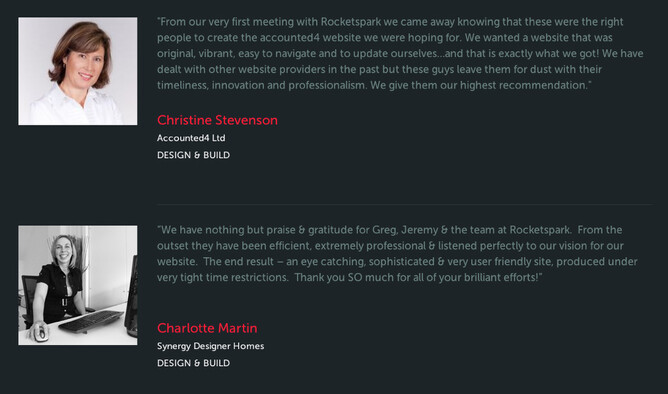Riddle me this: what does the Watergate scandal have to do with your business?
Trust. The Watergate scandal undermined the American public’s trust in their government. Now people are skeptical not just about politics but just about everything—including businesses. Gone are the days that people readily trusted a business’s claims about itself (and gone are the days that a scandal could be reported without having “-gate” slapped onto the end of it).
These days, you have to earn trust. If you don’t, your business might end up embroiled in a, er, fail-gate. But establishing trust can be a challenge. One study found that 75% of people believe that companies don’t tell the truth in their advertising and another found that a mere 14% of people trust advertising. And this same sort of skepticism is likely to be at work when they visit your website. Potential customers won’t believe that your product is good just because you say it is. But they might if somebody else says it. And that is why you should use customer testimonials.
Using testimonials is like harnessing positive word-of-mouth—that holy grail of advertising—and giving it a platform. Marketing Experiments conducted some research into the power of customer testimonials. They designed two different versions of an online customer registration process, one version had testimonials and the other version didn’t. They found that written testimonials increased customer conversion by 25%. And when they used video testimonials—you might want to sit down for this—conversion rates increased by a whopping 201%! (See “Choosing the Format” below for further discussion about the pros and cons of using written and video testimonials.) Testimonials can work wonders.
Testimonials convey authenticity
In a world of endless spin, scandals and something-gates, what people are really after is authenticity. They want to know what your goods or services are really like. Anything that smacks of corporate spin will backfire, writing off your testimonials as worthless or, worse yet, dishonest. The effectiveness of your testimonials is tied to how authentic users believe them to be. That means that you need:
Real testimonials. You can solicit testimonials from customers. You can even coach them a little bit. But don’t cross that line and start dictating exactly what they say. Don’t force them into raving about the quality of your product if it’s actually just your prices that they love. Users will be able to sniff out phony testimonials. The person gushing about your business really needs to believe the gush! So getting the right person to provide the testimonial is half the battle. If they really are a big fan of your business, they’ll give a glowing testimonial that’s completely trustworthy.
Real people. This goes without saying, of course, but if you’re not careful users might think that you’ve just written a few testimonials yourself and slapped some meaningless initials, “K.G.,” onto them. You need to show your users that these testimonials are from bona fide customers. Including things like the person’s full name, title, company and photo will give the testimonial a credibility-boost.
Testimonials alleviate anxiety
If you’ve ever spent an hour in a shop um-ing and ah-ing over whether or not to buy a pair of shoes, you know that a certain amount of anxiety kicks in when you’re thinking about parting with your money: Does this product work? Will it break?? Is it worth the price??? Testimonials alleviate that anxiety.
The key thing is to figure out what sorts of things potential customers might worry about and include testimonials that speak to that concern. Here’s a couple of things that Marketing Experiments found helps allay people’s fears about buying a product:
Specificity. Hazy, generic-sounding testimonials (“This product is so good. Your business is great. Yay!”) are nowhere near as effective as specific ones (“All the other quotes we got were way out of our budget but this business’s prices were much more affordable for us”). Try to ensure that your testimonials are specific, perhaps focused on quality, reliability, service, price etc.
Proximity. Where you put your testimonials matters. It can be a good idea to have a “testimonials” webpage where you group all your testimonials in one spot, so that users specifically looking for them can find them easy-peasy. But Marketing Experiments recommend placing your testimonials strategically throughout your website. Ask yourself: Where on my website are concerns likely to crop up? If you have an online store, people might be worried about credit card security. A testimonial there could really help alleviate that anxiety. Or somebody might be scouring your “About Us” page, trying to get a handle on who you are. That might be another great place to put a testimonial.
One strategy is to have your testimonial start with a possible anxiety and then show how your business or product overcame it. Something like, “I thought it’d be too complicated to operate. But when the staff at this business showed me how it intuitive it was to use, I was hooked.”
Choosing the format for testimonials
Market Experiments found that written and video testimonials boosted conversion by 25% and 201% respectively. So video testimonials can be extremely effective. But before you rush off and accost your favourite customer with your Flipcam, remember that sometimes written testimonials are the better choice. For starters, they’re easier to obtain—just a quick email exchange and you’re done. And of course they’re much cheaper—filming a testimonial will take some time and money. But written testimonials are also a lot easier for users to take in. A video requires that the user click “play,” wait for it to buffer (!), and then sit through a full spiel. A quick quote can be absorbed at a glance. Regardless of the format, make them easy to digest with short quotes and short clips. Our advice: use video but use it sparingly.
Check out how we’ve done our testimonials here: www.rocketspark.co.nz/customer-stories
Re-Cap. Why are testimonials important? How to do testimonials on your website
Let’s review the ground we’ve covered:
Testimonials help build trust.
Authenticity is key, so use real testimonials from real people.
Alleviate anxiety by being specific and placing testimonials strategically.
Written and video testimonials both have their place. Videos can be even more effective, but should be used sparingly.
If used well, customer testimonials can build trust, increase sales and keep your business from being another fail-gate.


